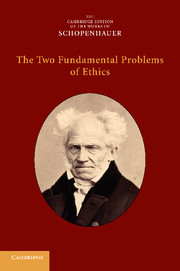Book contents
- Frontmatter
- Contents
- General editor's preface
- Editorial notes and references
- Introduction
- Notes on text and translation
- Chronology
- Bibliography
- THE TWO FUNDAMENTAL PROBLEMS OF ETHICS
- Contents
- Preface to the first edition
- Preface to the second edition
- Prize essay on the freedom of the will
- Prize essay on the basis of morals
- Variants in different editions
- Glossary of names
- Index
Prize essay on the freedom of the will
Published online by Cambridge University Press: 06 November 2009
- Frontmatter
- Contents
- General editor's preface
- Editorial notes and references
- Introduction
- Notes on text and translation
- Chronology
- Bibliography
- THE TWO FUNDAMENTAL PROBLEMS OF ETHICS
- Contents
- Preface to the first edition
- Preface to the second edition
- Prize essay on the freedom of the will
- Prize essay on the basis of morals
- Variants in different editions
- Glossary of names
- Index
Summary
Motto:
La liberté est un mystère
[Freedom is a mystery: after Helvétius, De l'esprit, Discours 1, ch. 4]The question set by the Royal Society reads as follows:
Num liberum hominum arbitrium e sui ipsius conscientia demonstrari potest?
In translation: ‘Can the freedom of the human will be proved from self-consciousness?’
DEFINITIONS OF CONCEPTS
In such a weighty, serious and difficult question, which in essence coincides with a major problem for the entire philosophy of the middle and modern ages, great precision is certainly in place, and so therefore is an analysis of the main concepts that occur in the question.
What does freedom mean?
This concept, considered precisely, is a negative one. With it we think merely of the absence of everything that hinders or restrains, which in turn, as manifesting force, must be something positive. The concept has three very different sub-species, corresponding to the possible nature of the hindrance: physical, intellectual and moral freedom.
a) Physical freedom is the absence of material hindrances of any kind. Thus we say: free sky, free view, free air, free space, a free place, free heat (which is not chemically bound), free electricity, free course of a stream, when it is no longer restrained by mountains or sluices, and so on. Even free lodging, free board, free press, a postage-free letter, indicate the absence of the burdensome conditions which tend to attach to such things as hindrances to enjoyment.
- Type
- Chapter
- Information
- The Two Fundamental Problems of Ethics , pp. 31 - 112Publisher: Cambridge University PressPrint publication year: 2009
- 1
- Cited by

